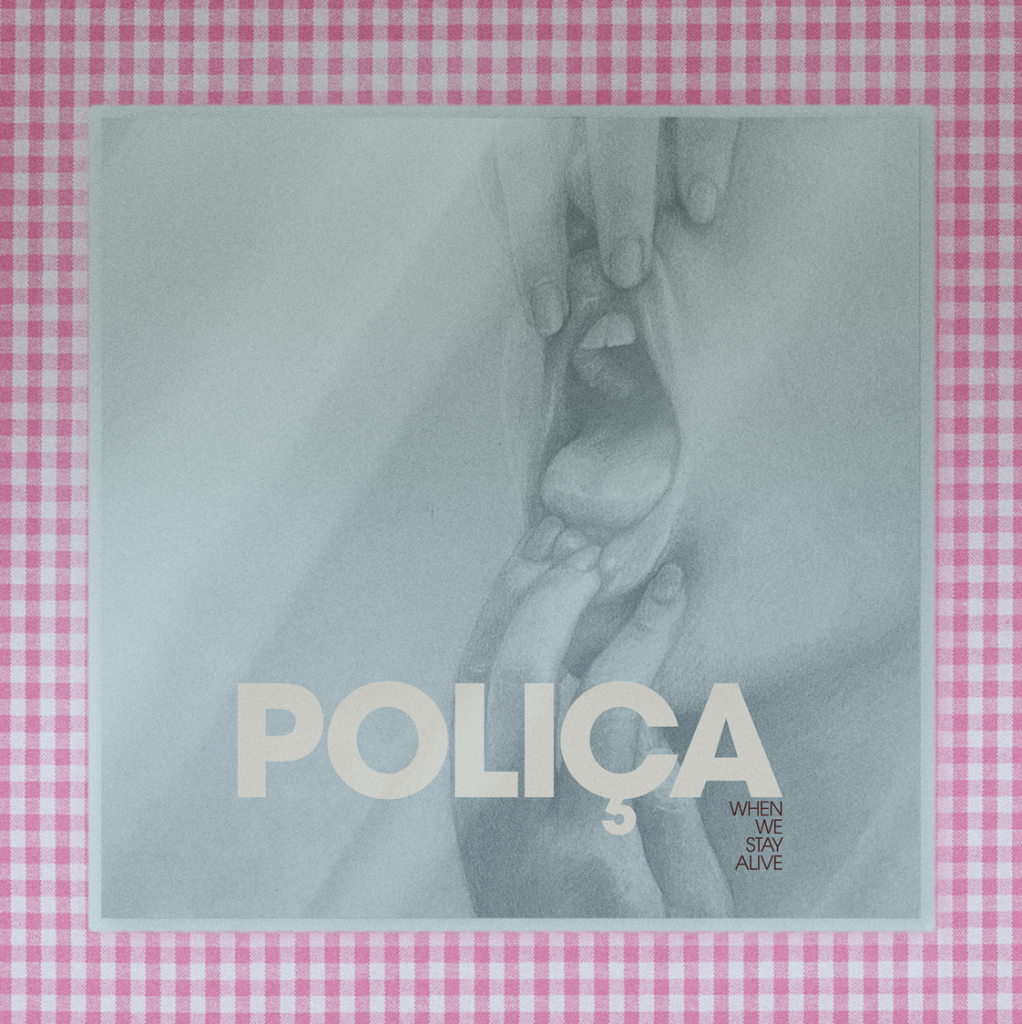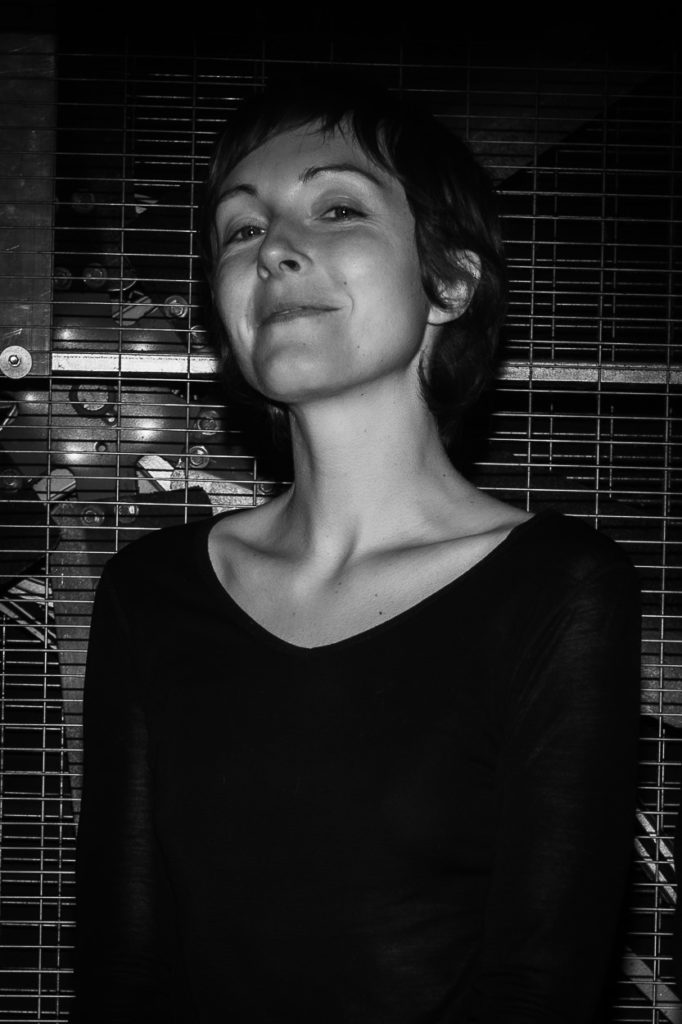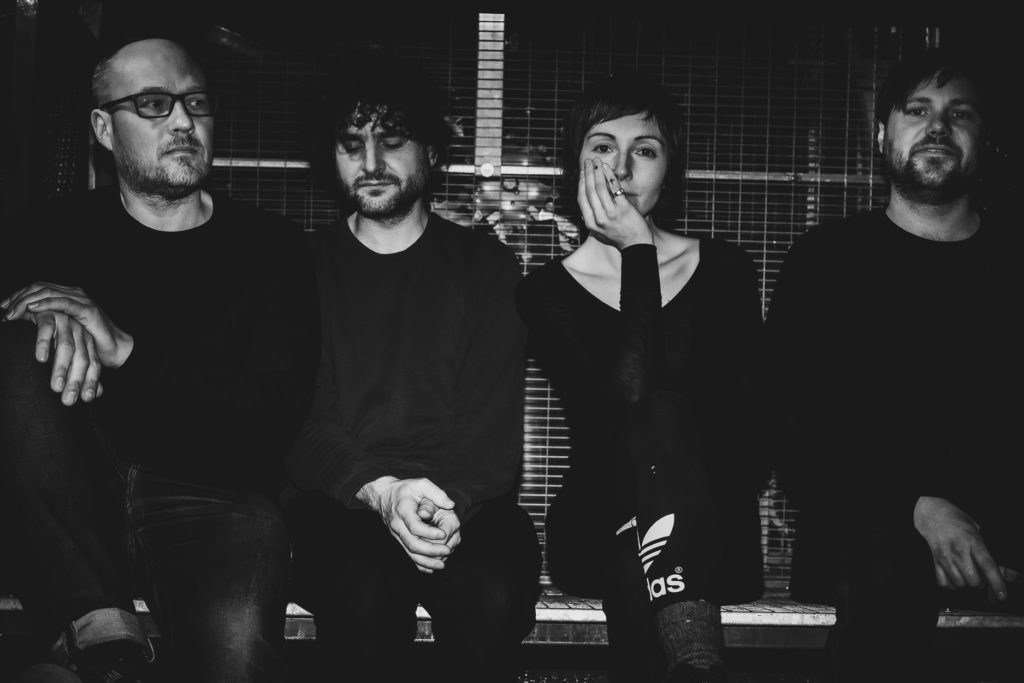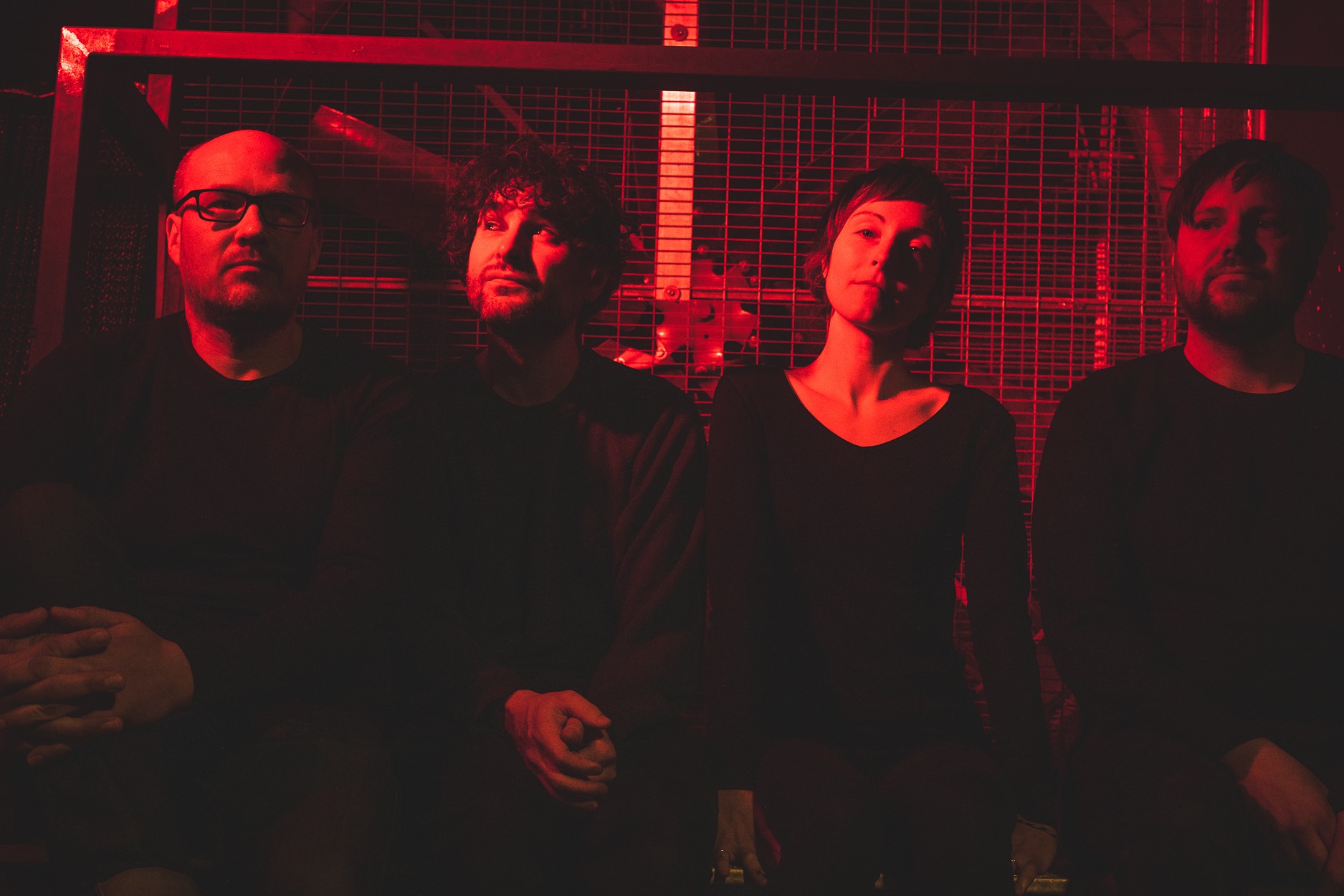Foto-© Sebastian Madej
Es gibt sie seit 2011, trotzdem hat man das Gefühl, sie seien schon eine halbe Ewigkeit dabei. Poliça haben sich eingeprägt, es kommen Einflüsse aus Synth-Pop, R&B, Rock, Trip-Hop und Dub in ihrer Musik vor, aber nicht in schamlos derivativer Art. Über der Musik schwebt die Stimme von Channy Leaneagh fast wie die einer Liz Fraser, gerne mit technischem Know-how futuristisch verfremdet.
Die Sängerin weilt Ende Februar in Berlin, um mit Poliça das neue Album When We Stay Alive vorzustellen. Im Studio war Justin Vernon von Bon Iver mit einem Beitrag als Gast beteiligt – er hat Poliça mal als beste Band bezeichnet, die er je gehört hat. Channy redet über solche Komplimente nicht so gerne, dafür aber über andere Dinge. Im Vorbereitungsbereich des Columbia Theaters erwartet sie ihren Gesprächspartner in meditierender Haltung auf dem Sofa. Danach berichtet sie unter anderem von einem schweren Unfall, als sie mit der Eisbeseitigung auf dem Dach ihres Hauses in Minnesota beschäftigt war. Heute merkt man äußerlich nichts davon. Einige Stunden nach dem Interview wurden Channy, Bassist Chris Bierden und die Drummer Ben Ivascu und Drew Christopherson im ehemaligen Soldatenkino am Flughafen Tempelhof vom Publikum lautstark gefeiert. In einem sich ständig verändernden Musikgeschäft behalten Poliça ihren Platz – live übrigens ohne den musikalischen Chefentwickler Ryan Olson, der lieber zu Hause und im Hintergrund bleibt.

How are you doing on this European tour so far?
It‘s been a bit of an adjustment, because we were off the road for almost two years and we all got very comfortable. I got very comfortable being home. I have a little boy who‘s 4 now. But we really wanted to come out here at least once after the record, because Europe has always been so supportive, and it was important for me to come out and say thank you to everybody.
How does it feel to come back after a long break in this day and age, where so much new music is coming out that is available for each and everyone with a net connection all over the world?
It‘s interesting, the industry, the people in charge, like bookers or labels, the people that sign the cheques and make the money aren‘t in the future yet. They‘re sticking to the old philosophy, which is to put out a record and live off that record, then make another record for four years and everybody‘s excited to come out and see you again. I think what happens now is people don‘t have the patience and the attention span, at least in America, to remember you if you‘ve taken four years off. There really is no magic trick. Sometimes it works for people to put out a record after four years and everybody loves it. Sometimes people need to be putting out stuff weekly. It depends on the relationship you have with the people you make music for, your age and your newness and the kind of music you‘re making.
Is Ryan on tour with you and the band this time?
He‘s not on tour this time at all, because we have children together. He‘s home with them and producing at home, he‘s got a lot of projects and so we have to split. He doesn‘t enjoy touring. It‘s best for him to keep making music at home, it‘s hard to make music on the road.

Ryan has produced the new album by Swamp Dogg on which you sing. How did this collaboration come about?
I wouldn‘t say I was a part of that record, I just sang harmonies. I was never in the studio with Swamp. I did it out of my house. We‘ve gotten to know Swamp, this is the second record Ryan‘s produced for Swamp Dogg. They were connected through a distributor. He thought their personalities would really gel and that they would be a good team. They did hit it off, Ryan‘s loved working on it, enough to make it two, and also to make a record with John Prine on it, which was a love project of Ryan‘s. It was a labour of love for a lot of people in the background who wanted to get John Prine and Swamp Dogg in the same studio again to sing together.
You had other stuff to worry about recently, since you fell from the rooftop of your house in Minnesota while you tried to get rid of ice on it. Let us know how it happened.
It‘s a pretty common thing in Minnesota, it‘s also something people do and hurt themselves from. It can cause irreparable damage to a home, it happens when there‘s lots of quick thaws and quick freezes. The ice dams have gotten really bad for everyone across the state, you‘d drive across the state and see icicles as tall as this room is. When the dams start to melt under these big thick layers of snow, then water pours into your roof and you‘re in tens of thousands of dollars worth of damage. You can get it done by a professional, the cheapest rate is a thousand per hour, because it‘s a difficult job.
You had to look for an alternative. What kind of idea came to your mind?
I made this plan watching youtube videos where you fill women‘s nylons with sodium chloride. They sit on the ice dam and they melt through, that creates a path for the water to get out. I‘ve been doing it for a while. I‘m somebody who likes to do these things, if there‘s a problem I try to fix it. I do all the yard work, I do a lot of the painting in the house. We try to do as much as we can on our own, because we haven‘t saved much money. On this particular day it didn‘t work and I slipped. It wasn‘t that high, it was ten feet.
Would you now consider to hire a repair man for a thousand bucks?
No, I wouldn‘t. I don‘t have that kind of money, but I would just let it go now. You do have these rakes, you can rake the snow. You can‘t get everything, but now I‘ve learned to let things go. If there‘s that damage, then there‘s that damage. It was a particularly bad winter too, now we don‘t have that problem this year.

After the accident you had to take a rest. How did that situation influence your creativity? What kind of music did you listen to, what kind of books did you read?
Hm, I don‘t know if I listened to much music really. I can‘t think of anything I listened to, but that‘s pretty common. I don‘t listen to a lot of music. But I did read a ton, people would bring me books. A friend brought me The Mists Of Avalon by Marion Zimmer Bradley, I love that book so much. It‘s a King Arthur-ish book from the view of a woman. Then I‘ve read some Eckhart Tolle, about letting go of the ego and victimhood. I‘ve also read some self-help books. When I fell it kind of felt that I forced this upon myself and I wasn‘t very happy. I don‘t believe we get sick, because we feel sad. But when you‘re so depressed or hurting so much inside, you can be living unconsciously and make a lot of silly errors because you‘re not in your body thinking about the choices you‘re making. I was realizing I need to figure that out, and people brought me books about those kind of things, like Gay Hendricks, books about realizing why we‘re here or what your purpose is.
Would you go so far to say that working on the lyrics for the new album was akin to being in a long therapy session?
Well, that‘s how it‘s always been for me. I always write lyrics first and foremost for myself. It‘s a fun acitivity for me to get a music track, which means the synth and the beats, the skeleton of a song, and then to hear it and see what comes out of me from that. How do I react to what this person sent me? In that way I can uncover things about myself or the people around me that I wasn‘t able to see before I wrote the song.
Are you openly reflecting upon difficulty, pain and hardship that has bothered you throughout your life on this record?
Even before I fell I was in a time, where everything was crumbling and things were very unstable and all of my structures of stability were falling apart. I have been working with people who are suffering from Alzheimers and who were paralyzed. It‘s hard to see how living is easy when we are at the same time inundated with these images of fame and wealth and some people really living this very carefree life. But then in reality, what you‘re feeling and what you‘re seeing, is a lot of people suffering.
Are there family members or friends of yours who are suffering from health problems?
I was working as a nurse assistant before I fell….at the same time my parents had left and they were the backbone of the reason I was even able to tour as a musician. Even though they were working full-time, they took care of my kids when they came home from school when I was gone to play music. Also I was learning to be truly an adult in a way that I hadn‘t. I was an adult before, but I had a strong family support. Now I had to learn to be the sole parents of my kids when my own parents aren‘t around anymore. It tended to make me very nostalgic about my own upbringing, about my family. The lyrics are all swimming around thoughts about what‘s going on my life. I‘m also reacting to things going on around me in the world and my friend‘s life and I‘m making little stories. The difference with this record is after the accident I tried to see, if there‘s a way I could use these little stories to empower me a bit more and maybe other people as well. I noticed I had a habit of writing songs that sat me deeper into the depths of sorrow, instead of helping me to imagine another way. There‘s hope in songs like Be Again, Feel Life. Even Fold Up is in a way about not sitting so much in the darkness, but trying to have jovialness about loneliness, to make fun of it in a way.

You‘re using the word we in the title of your record. There are dangers in the world today, the climate crisis is an example. In what way do you incorporate these problems in your train of thought?
There‘s this song Sea Without Blue. It begins with the line „Milkweed fills the field out the way from where I live…“. Milkweed is the plant that the monarch butterflies love. In our neighbourhood in Minnesota everyone‘s growing milkweed, but there‘s still no butterflies. They‘re trying to bring back butterflies through the growing of milkweed, but all the wings have long died off, the butterflies have long gone. It‘s this idea of When We Stay Alive, what if all the butterflies and bees die, the climate is unhabitable for many, and then what happens when some of us stay alive? While this record was going on I also had a few friends that had committed suicide or tried and then they survived. When it turns out you‘re still alive you have to deal with the repercussions and the consequences of the people you terrified, and also try to make a new way about it. One of my friends who had done this even took care of me while I was healing. It‘s just a great sorrow and acceptance when you try to leave but you couldn‘t. Then you have to stay and figure how to make it work. In the climate crisis you can go into a place of complete nihilism or negativity thinking it‘s all going to be over soon. But you can also change your viewpoint and think…well, we‘re here, what are we going to do with this day, even if we can‘t change the politicians? How are we going to feel life, how are we going to exist in our own imperfections, our hypocrisy or our violence and stilll find a reason to live?
How did your thought process influence the making of the music?
Ryan and I never talk about lyrics, just in the same way I don‘t talk to him about the way he‘s producing it. Only through interviews he might find out what I‘m precisely talking about, but he can still garner his own meaning. How we communicate is by pouring ourselves into our assignments. I think that‘s the situation with all of us in Poliça. It might seem like a cliché, but I don‘t talk about myself or the music I make unless I‘m doing interviews. The friendships I have at home, they‘re not existing around music or the music I make. It‘s a very private thing and it‘s great for me as sort of an introvert, as a quiet person, because I‘m able to speak to Ryan and to communicate to the band, to Chris, Ben and Drew, about how much I love them and how much I love playing music with them, without having to say specific words or for us to even have a conversation about it. We do so by giving everything to each song. Ryan pours all of himself into all of the projects he‘s making as part of Poliça around the clock, trying to make these songs the best we can make them. It‘s very personal, but it doesn‘t ever involve conversations with words.
Can you give an example?
Ryan will send me a skeleton of, say, Steady. This was hardly a song first, it had this very sparse bit of notes. I put my lyrics onto it and my melody, then Ryan adds tons of stuff and spends a year adding and bringing other people in. He‘s feeding off my lyrics and way I‘m singing it without us having to talk about what they mean, but just by how they make him feel, and then Chris does the same thing. He comes in and he‘s listening to the song the way I‘m singing it and he‘s feeding off on that and adding his vocal harmonies. It‘s this unspoken way that music works like in an orchestra – the reason why we keep doing it is because of that communication without words is fantastic. We all find personal artistic fulfillment in this band, that‘s why we are always happy to return.










